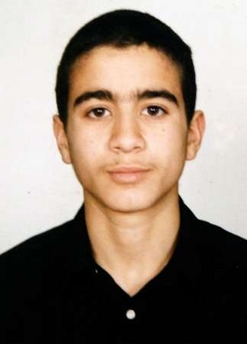|
US charges five Guantanamo detainees with war crimes
(Reuters)
Updated: 2005-11-08 09:27
Five foreign terrorism suspects at the U.S. military prison in Guantanamo
Bay, Cuba, have been charged with war crimes and will face military trials,
bringing to nine the number charged at Guantanamo to date, the Pentagon
announced on Monday.
Two of the five "enemy combatants" facing charges are from Saudi Arabia, the
Pentagon said. The other three are from Algeria, Ethiopia and Canada. Nearly 500
detainees are being held at the Navy prison in Cuba.
The charges were announced just hours after the Supreme Court said it would
decide whether President George W. Bush has the power to create military
tribunals to put Guantanamo prisoners on trial for war crimes, an important test
of the administration's policy in the war on terrorism.
The five suspects face charges ranging from murder to attacking civilians,
the Pentagon said. The Canadian, a teen-ager, is accused of killing a U.S.
soldier in Afghanistan.

A family portrait of Omar Khadr, who is
detained by United States forces at Guantanamo Bay, is shown at a press
conference in Toronto in this February 9, 2005 file photo.
[Reuters/file] | No dates have been set for trials of the five by U.S. military commissions,
which critics have said do not give detainees the same rights as civilian
courts.
Hundreds of other detainees held at Guantanamo, most of them arrested in
Afghanistan and many held for more than three years, have not yet been charged.
The Guantanamo facility opened in January 2002, just months after the September
11, 2001, attacks on the United States.
The Bush administration has come under strong international criticism,
including from the International Committee of the Red Cross, for holding
prisoners for years without charging them. The administration counters that the
terror suspects do not have rights guaranteed under the Geneva Conventions.
The Pentagon on Monday identified the five charged as Ghassan Abdullah al
Sharbi and Jabran Said bin al Qahtani of Saudi Arabia, Sufyian Barhoumi of
Algeria, Binyam Ahmed Muhammad of Ethiopia and Omar Khadr of Canada.
CANADIAN TEEN-AGER CHARGED
Khadr, a Canadian who recently turned 19 years old, was just 15 when he was
sent to Guantanamo and is accused of killing a U.S. soldier in Afghanistan and
with attempted murder.
The other four are charged with conspiracy to commit murder, attacks on
innocent civilians, destruction of property and terrorism.
Barbara Olshansky, an attorney with the Center for Constitutional Rights who
has represented Khadr and other Guantanamo prisoners, called it shocking that
the charges were announced on the day the Supreme Court said it would review the
legality of military tribunals.
"The fact that they've seen fit to designate people for trial by military
commission when the very constitutionality of the tribunal is up before the
Supreme Court just evinces the most blatant disdain for the judicial branch and
the separation of powers principle," Olshansky said.
Khadr is the son of suspected al Qaeda financier Ahmed Said Khadr, who was
born in Egypt and jailed in Pakistan in 1996 for alleged involvement in an
Egyptian Embassy bombing before being freed at the request of Jean Chretien,
Canadian prime minister at the time.
The elder Khadr was killed in a 2003 shootout with Pakistani security forces
at an al Qaeda compound.
The four detainees charged earlier include Australian David Hicks, two
Yemenis and a Sudanese.
Hicks' trial, put on hold last year because of federal court rulings over
Guantanamo, is set to resume on November 18. Dates have not been set for trials
of the other three men.
Spurning a request by U.N. human rights investigators, U.S. Defense Secretary
Donald Rumsfeld said last week that the United States would not allow them to
meet with detainees at Guantanamo.
Rumsfeld also told a Pentagon news conference that prisoners at the naval
base were staging a hunger strike that began in early August as a successful
ploy to attract media attention.
The military said last week that 27 detainees were engaging in the hunger
strike, including 24 receiving forced-feedings. But detainees' lawyers estimated
that about 200 were taking part and that the strike was a protest of the
prisoners' conditions and lack of legal rights.
|